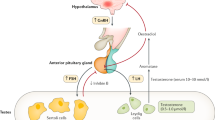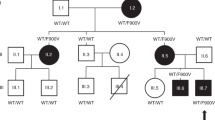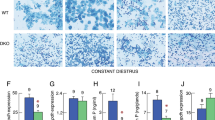Abstract
FAMILIAL hypogonadism in man, due to an isolated deficiency of gonadotrophin secretion, has been well documented1–6, but difficult to investigate because of the lack of a suitable animal model4. We report here the genetic and endocrinological background of a mutant strain of mouse in which the testes and ovaries fail to develop postnatally. The primary cause of this seems to be a deficiency in hypothalamic gonadotrophin-releasing hormone (GnRH) with a consequent reduction in pituitary content and circulating levels of luteinising hormone (LH) and follicle-stimulating hormone (FSH). By analogy with the Brattleboro rat (genetic defect in vasopressin synthesis) this mutant should prove useful for studying the synthesis of hypothalamic releasing hormones as well as the role of the hypothalamic–gonadotrophin system in sexual differentiation, puberty, folliculogenesis and spermatogenesis. The mutant has been named hypogonadal, symbol hpg.
This is a preview of subscription content, access via your institution
Access options
Subscribe to this journal
Receive 51 print issues and online access
$199.00 per year
only $3.90 per issue
Buy this article
- Purchase on Springer Link
- Instant access to full article PDF
Prices may be subject to local taxes which are calculated during checkout
Similar content being viewed by others
References
Kallman, F. J., Schoenfeld, W. A. & Barrera, S. E. Am. J. ment. Defic. 48, 203–236 (1944).
Nowakowski, H. & Lenz, W. Rec. Progr. Horm. Res. 17, 53–89 (1961).
Ewer, R. W. J. clin. Endocr. Metab. 28, 783–788 (1968).
Naftolin, F., Harris, G. W. & Bobrow, M. Nature 232, 496–497 (1971).
Santen, R. J. & Paulsen, C. A. J. clin. Endocr. Metab. 36, 47–54 (1973).
Boyar, R. M., Wu, R. H. K., Kapen, S., Hellman, L., Weitzman, E. D. & Finkelstein, J. W. J. clin. Endocr. Metab. 43, 1268–1275 (1976).
Cattanach, B. M., Williams, C. E. & Bailey, H. Cytogenetics 11, 412–423 (1972).
Chester-Jones, I. Br. med. Bull. 11, 156–158 (1955).
Brown-Grant, K. in Regulation and Control in Living Systems (ed. Kalmus, H.) 176–255 (Wiley, London, 1966).
Nett, T. M., Akbar, A. M., Niswender, G. D., Hedlund, M. J. & White, W. F. J. clin. Endocr. Metab. 36, 880–885 (1973).
Chiappa, S. A. & Fink, G. J. Endocr. 72, 195–210 (1977).
Niswender, G. D., Midgley, A. R., Jr, Montoe, S. E. & Reichert, L. E. Jr, Proc. Soc. exp. Biol. Med. 128, 807–811 (1968).
Daane, T. A. & Parlow, A. F. Endocrinology 88, 653–663 (1971).
Author information
Authors and Affiliations
Rights and permissions
About this article
Cite this article
CATTANACH, B., IDDON, C., CHARLTON, H. et al. Gonadotrophin-releasing hormone deficiency in a mutant mouse with hypogonadism. Nature 269, 338–340 (1977). https://doi.org/10.1038/269338a0
Received:
Accepted:
Published:
Issue Date:
DOI: https://doi.org/10.1038/269338a0
This article is cited by
-
Genetic hypogonadal mouse model reveals niche-specific influence of reproductive axis and sex on intestinal microbial communities
Biology of Sex Differences (2023)
-
Maintenance of type 2 glycolytic myofibers with age by Mib1-Actn3 axis
Nature Communications (2021)
-
Genetics of congenital hypogonadotropic hypogonadism: peculiarities and phenotype of an oligogenic disease
Human Genetics (2021)
-
Mechanisms underlying pre- and postnatal development of the vomeronasal organ
Cellular and Molecular Life Sciences (2021)
-
The role of gonadotrophins in gonocyte transformation during minipuberty
Pediatric Surgery International (2020)
Comments
By submitting a comment you agree to abide by our Terms and Community Guidelines. If you find something abusive or that does not comply with our terms or guidelines please flag it as inappropriate.



